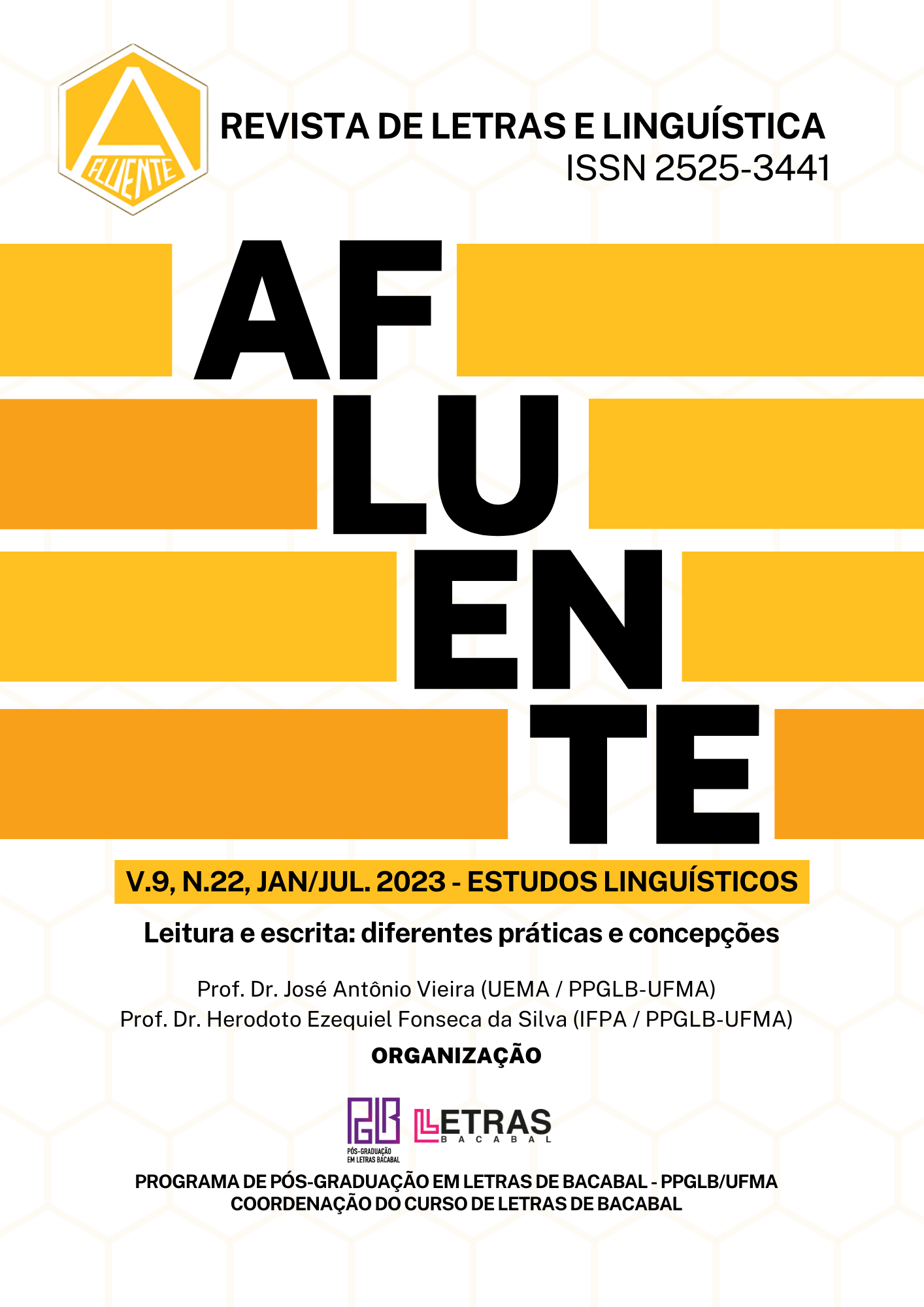Reflections about the interference of speech in the reading of eighth and ninth grade students at a public school in the city of Imperatriz-MA
DOI:
https://doi.org/10.18764/2525-3441v8n23.2023.34Keywords:
Sociolinguistics, linguistic variation, readingAbstract
This research investigated the phenomena that occur in the oral speech of eighth and ninth grade students at a peripheralpublic school in the city of Imperatriz – Maranhão. It analyzed whether when the student reads, he transfers marks from
speaking toreading or whether he has monitored reading and is faithful, phonetically, to what is written. To this end, qualitative research of anethnographic nature was carried out. The analysis is based on theorists such as Castilho (2021); Labov (1972, 2008); Bortoni-Ricardo, (2014, 2021); Bagno (2012), interallia, and official documents that govern Brazilian basic education. The research shows the existence oflinguistic variety in the classroom and traces of orality in students' reading. The collaborating students were from a peripheral
school,which has less access to language considered to be cultured, so they tend to vary more when using the language orally, even whenreading. It was also found that the school does not have a library, so reading is not practiced regularly by students. It is then up tomanagers to provide the necessary conditions for reading to be practiced regularly, as it should. When the student understandslinguistic aspects more, when he reads and understands, he can do better in all curricular components. He will better master the use ofthe cultured modality of speaking and writing and will be more faithful to what is written when he reads it. This study is consideredrelevant not only because the official legislation concerning language teaching in basic education shows the need to reflect on languagephenomena, especially those related to the issue of linguistic variety and variation, but because it can collaborate with the work teacher,presenting reflections on the students’ use of the language
Downloads
References
BAGNO, M. Gramática Pedagógica do Português Brasileiro. São Paulo: Parábola, 2012.
BRASIL. Ministério da Educação. Base Nacional Comum Curricular. Brasília: MEC, 2017.
BRASIL, Ministério da Educação. Secretaria de Educação Fundamental. Parâmetros Curriculares Nacionais: língua portuguesa. Brasília: SEED, 1998.
BORTONI-RICARDO, S. M. Português brasileiro: a língua que falamos. 4. ed. São Paulo: Parábola, 2021.
BORTONI-RICARDO, S. M. Manual de Sociolinguística. São Paulo: Contexto, 2014.
CASTILHO, A. T. de. A língua falada no ensino de português. São Paulo: Contexto, 2021.
COELHO, I. L.; GÖRSKI, E. M.; SOUZA, C. M. N. de; MAY, G. H. Para conhecer: Sociolinguística. São Paulo: Contexto, 2018.
CRESWELL, J. W. Projeto de Pesquisa: Métodos qualitativo, quantitativo e misto. 2ª ed. Porto Alegre: Artmed/Bookman, 2021.
FREIRE, P. A Importância do Ato de Ler: em três artigos que se completam. 23ª ed. São Paulo: Cortez: Autores associados, 1989.
LABOV, W. Padrões Sociolinguísticos. São Paulo, Parábola, 2008.
OTHERO, G. A. Mitos de Linguagem. São Paulo: Parábola, 2017.
SOARES, M. Linguagem e escola: uma perspectiva social. São Paulo: Contexto, 2017.
SOLÉ, I. Estratégias de leitura. Trad. Cláudia Schilling. 6. ed. Porto Alegre: Artmed, 2012.
Downloads
Published
How to Cite
Issue
Section
License
Copyright (c) 2023 Afluente: Revista de Letras e Linguística

This work is licensed under a Creative Commons Attribution 4.0 International License.
Direitos autorais Afluente: Revista Eletrônica de Letras e Linguística
Este trabalho está licenciado com uma Licença Creative Commons - Atribuição 4.0 Internacional.














